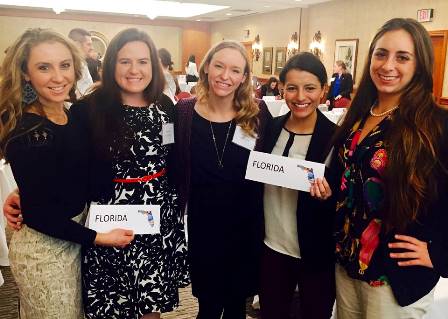UF veterinary medical students witness government in action
 A group of three University of Florida veterinary medical students joined others from across the country for two days in Washington, D.C., during which they learned about the legislative process and about current legislation affecting the veterinary medical profession.
A group of three University of Florida veterinary medical students joined others from across the country for two days in Washington, D.C., during which they learned about the legislative process and about current legislation affecting the veterinary medical profession.
The American Veterinary Medical Association sponsors the annual event, known as Student Legislative Day, or more informally as the AVMA Fly-In, in an effort to better educate students, veterinarians and members of Congress on public policy issues facing the veterinary profession.
From the recently introduced Veterinary Medicine Loan Repayment Program Enhancement Act, which provides incentives to livestock or public health veterinarians who practice in rural areas of the country that are in need of veterinary services, to student loan proposals expected to be considered under the upcoming reauthorization of the Higher Education Act, attendees had a lot to talk about with their elected officials during the event held March 1-3, according to an AVMA press release.

The five students who represented Florida at the AVMA Legislative Fly-in, from left to right, were Teresa Duthie, Amy Smith, Kira Purdon, Jennifer Zamora and Katelyn Sheppard. (Photo courtesy of Katelyn Sheppard)
“I learned that veterinarians play a large and important role in our government and have an impact on the industry via things other than simple medical treatment,” said first-year UF veterinary student Amy Smith.
Smith, along with fellow first-year student Katelyn Sheppard and second-year student Teresa Duthie represented the college. All of the students were able to meet veterinarians who advise members of Congress on issues of animal, human, and public health.
“They explained the vital role of veterinarians in the analysis of issues that affect many elements of everyday life,” Smith said. “Additionally, I learned how the AVMA works to advocate for our profession on Capitol Hill and was able to participate in this advocacy.”
The UF group met with the staff of Florida’s two senators as well as the staff of the representatives from our respective districts.
“These meetings enabled us to provide a window into the veterinary industry for our legislators,” Smith said. “As is the case for many issues, we believe that many of the issues facing veterinary medicine are rooted in ignorance. Our goal for visiting with these legislators was to provide insight that could begin to chip away at ignorance that could negatively affect veterinarians in the future.”
First-year student Katelyn Sheppard said the Fly-In opened her eyes to the idea that a D.V.M. degree “means much more than an education in practicing medicine.”

Three UF veterinary students , Amy Smith, Katelyn Sheppard and Teresa Duthie, do the chomp at AVMA Fly-in 2015. (Photo courtesy of Katelyn Sheppard)
“Veterinarians are able to be extremely valuable assets in the political process because they provide a very unique level of thinking,” she said. “As explained by several speakers, including Congressman Ted Yoho, the four years spent in veterinary school train you to approach problems systematically. In politics and in clinics, this tactic is helpful in addressing the underlying disease instead of just the symptoms.”
Dr. Eric Deeble, a previous AVMA Congressional Fellow who now works for New York’s Senator Kristen Gillibrand, told the students that the volume of information taught in veterinary school trained him to be able to take complicated information and break it down into simpler concepts.
“Overall, I was extremely impressed with how well-spoken all the congressmen and other veterinarians working in government relations were,” Sheppard said. “Communication skills, whether on a large scale basis with the government or on a smaller scale basis with an individual client, are extremely important for the success of our profession.”
The specific legislation the students were tasked to discuss included the Veterinary Loan Repayment Enhancement Act and the Higher Education Act.
Sheppard took a keen interest in the Enhancement act because she hopes to practice food animal medicine in a rural practice area.
“The AVMA is working on removing a tax on the money allocated to the USDA. Currently, the funding which pays for the program is taxed 39 percent by the IRS,” she said. “If the tax was removed, 100 more veterinarians could be added to the program. I personally will have about $210,000 in debt when I graduate and if I was to move to a rural area, my expected salary upon graduation will probably be around $50,000. Even though the Enhancement Act is a band-aid for the debt-to-salary ratio, veterinarians need to be able to make a living in underserved areas where our food supply is raised.”
She said she learned far more than she expected about the legislative process and how veterinarians can take leadership roles on a local, state or federal level.
“If veterinarians want to be represented and ensure our patients and clients receive the best care possible, we need to step outside of general private practice and fully utilize the training and talents we receive as veterinarians,” Sheppard said.










